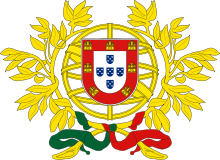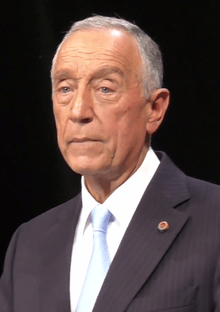President of Portugal
| President of the Portuguese Republic
Presidente da República Portuguesa | |
|---|---|
|
| |
|
| |
| Style | His/Her Excellency[1] |
| Type | Executive |
| Member of |
Council of State Council of Ministers |
| Residence | Belém Palace |
| Seat | Lisbon, Portugal |
| Appointer |
Direct election; Two-round system, universal suffrage |
| Term length |
Five years; Renewable once, consecutively. |
| Constituting instrument |
Constitution of the Third Republic |
| Precursor | King of Portugal |
| Formation | 5 October 1910 |
| First holder | Manuel de Arriaga |
| Salary |
€93,364.74 (2015) (€6,668.91/month)[2] |
| Website | presidencia.pt |
 |
| This article is part of a series on the politics and government of Portugal |
| Constitution |
|
Legislature |
| Foreign relations |
The President of the Portuguese Republic (Portuguese: Presidente da República Portuguesa, pronounced [pɾɨziˈðẽtɨ ðɐ ʁɛˈpuβlikɐ puɾtuˈɡezɐ]) is the executive head of state of Portugal. The powers, functions and duties of prior presidential offices, and their relation with the Prime Minister and cabinets has over time differed with the various Portuguese constitutions.
The current President of Portugal is Marcelo Rebelo de Sousa, who took office on 9 March 2016.
Role
The Portuguese Third Republic is a semi-presidential system. Unlike several other European presidents, the Portuguese President is quite powerful. Although it is the Prime Minister of Portugal and parliament that oversee much of the nation's actual day-to-day affairs, the Portuguese President wields significant influence and authority, especially in the fields of national security and foreign policy. The president holds the nation's most senior office, and outranks all other politicians.
The President's greatest power is his/her ability to choose the Prime Minister. However, since the Assembly of the Republic has the sole power to dismiss the Prime Minister's government, the Prime Minister named by the President must have the confidence of the majority of the representatives in the assembly, otherwise he may face a motion of no confidence. The President has the discretionary power to dissolve parliament when he sees fit (colloquially known as the "atomic bomb" in Portugal), and President Sampaio made use of this prerogative in late 2004 to remove the controversial government of Pedro Santana Lopes, despite the absolute majority of deputies supporting the government.
Prior to the Carnation Revolution, the powers of the presidency varied widely; some presidents were virtual dictators (such as Pais, and Carmona in his early years), while others were little more than figureheads (such as Carmona in his later years, Craveiro Lopes, and Américo Thomaz; during their administrations, supreme power was held by Prime Minister António de Oliveira Salazar).
Powers
The constitution grants the following powers to the president:[3]
The President exercises the Supreme Commander of the Armed Forces and Grand Master of the Three Orders and shall appoint and remove, at the proposal of the Government, the Chief of the General Staff of the Armed Forces and the Military Staff Heads of the three branches the Armed Forces. The president can dissolve the Assembly of the Republic, which implies the need to call for new legislative elections and after the implementation of these, the resignation of the government.
The President appoints the Prime Minister, given the election results, and appoints the other members of the Government by proposal of the Prime Minister. He can, however, dismiss the Government when this is necessary to ensure the smooth functioning of democratic institutions. Even the government bodies of the autonomous regions may be dissolved by the President, by committing serious acts contrary to the Constitution.
The President declares a state of siege and emergency upon consultation with the Government and with permission of the Parliament.
At the proposal of the Government and with the authorization of the Parliament, the President can declare war in the event of actual or imminent aggression and can also propose peace.
The President promulgates or vetoes the promulgation of laws, decree-laws, regulatory decrees and other decrees of the Government.
In the area of his powers in international relations, the President of the Republic ratifies international treaties.
The President decides on referendums put forth to him by Parliament.
The President of the Republic may request the Constitutional Court prior review of the constitutionality of the norms of international agreements or decrees that they have been sent for promulgation as an organic law, law or ordinance.
The President shall appoint and remove, in some cases a proposal from the Government, holders of important state organs such as the Republic of Representatives for the autonomous regions, the President of the Court and the Attorney General, five members of the Council of State and two members of the Supreme Judicial Council.
The president appoints ambassadors and special envoys, following proposal by the Government, and accredits the foreign diplomatic representatives.
The President of the Republic, after consultation with the Government, pardons and commutes sentences.
Election
Under the Portuguese Constitution adopted in 1976, in the wake of the 1974 Carnation Revolution, the President is elected to a five-year term; there is no limit to the number of terms a president may serve, but a president who serves two consecutive terms may not serve again in the next five years after the second term finishes or in the following five years after his resignation.[3] The official residence of the Portuguese President is the Belém Palace.
The President is elected in a two-round system: if no candidate reaches 50% of the votes during the first round, the two candidates with the most votes face each other in a second round held two weeks later. However, the second round has only been needed once, during the 1986 presidential election. To date, all of the elected presidents since the Carnation Revolution have served for two consecutive terms, and presidents consistently rank as the most popular political figure in the country. Recently, however, the popularity of the president Cavaco Silva plummeted, making him the second-least popular political figure in the country, just above the Prime Minister, and the first Portuguese President after 1974 to have a negative popularity.[4]
If the president dies or becomes incapacitated while in office, the President of the Assembly assumes the office with restricted powers until a new president can be inaugurated following fresh elections.
2016 presidential election
Summary of the 24 January 2016 Portuguese presidential election results
| Candidates | Supporting parties | First round | ||
|---|---|---|---|---|
| Votes | % | |||
| Marcelo Rebelo de Sousa | Social Democratic Party, People's Party, People's Monarchist Party | 2,413,956 | 52.00 | |
| António Sampaio da Nóvoa | Independent supported by the Portuguese Workers' Communist Party, LIVRE | 1,062,138 | 22.88 | |
| Marisa Matias | Left Bloc, Socialist Alternative Movement | 469,814 | 10.12 | |
| Maria de Belém | Independent | 196,765 | 4.24 | |
| Edgar Silva | Portuguese Communist Party | 183,051 | 3.94 | |
| Vitorino Silva | Independent | 152,374 | 3.28 | |
| Paulo de Morais | Independent | 100,191 | 2.16 | |
| Henrique Neto | Independent | 39,163 | 0.84 | |
| Jorge Sequeira | Independent | 13,954 | 0.30 | |
| Cândido Ferreira | Independent | 10,609 | 0.23 | |
| Total valid | 4,642,015 | 100.00 | ||
| Blank ballots | 58,964 | 1.24 | ||
| Invalid ballots | 43,588 | 0.92 | ||
| Total (turnout 48.66%) | 4,744,597 | |||
| Source: Comissão Nacional de Eleições | ||||
State visits
The President of Portugal often makes official state visits to other foreign countries.
Living former Presidents
There are three living former Portuguese Presidents:
See also
References
- ↑ "United Nations Protocol and Liaison Service Public List: Heads of State - Heads of Government - Ministers For Foreign Affairs". Retrieved 14 October 2016.
- ↑ Miguel Santos (23 September 2015). "E agora um tema sensível: os políticos são mal pagos?". Observador (in Portuguese). Lisbon. Retrieved 12 October 2016.
Todos os salários de detentores de cargos políticos são calculados em função do salário bruto do Presidente da República — 6 668 euros brutos (a que acresce 25% de despesas de representação).
- 1 2 "Constitution of the Portuguese Republic" (PDF). Assembly of the Republic. 2005. Retrieved 6 June 2014.
- ↑ Francisco Teixeira (21 April 2011). "Cavaco é o primeiro PR com popularidade negativa". Diário Econónmico (in Portuguese). Lisbon. Retrieved 16 October 2016.


_(cropped).png)

